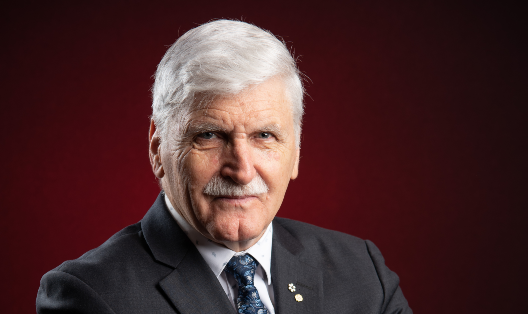
Moral Courage: Leading in times of conflict and crisis
Cleveringa Dallaire Critical Conversation Series
How do leaders sustain moral codes in times of adversity? How do they cope with the impact of war on the battlefield, in UN leadership, in criminal courts and at home? How do leaders find repair following moral injury?
Join Lieutenant-General (ret’d) The Honourable Roméo Dallaire and world experts in post-traumatic stress syndrome, children’s rights, war crimes, humanitarian law and peacekeeping for a series of important conversations about leadership and moral dilemma during times of conflict and crisis.
Heroes in Mind Advocacy and Research Consortium (HiMARC) is pleased to present this very special event series in collaboration with our research partners at Leiden University in the Netherlands and the Dallaire Institute for Children, Peace and Security at Dalhousie University.
Moral leadership and courage from different perspectives
Livestream Event
Wednesday, Sept. 22, 2021
11:30 a.m. MST
Hear from General Dallaire, University of Alberta President Bill Flanagan, and Dr. Suzette Brémault-Phillips, associate professor of occupational therapy and director of HiMARC, a provincial hub for research, teaching and service for military, Veteran, public safety personnel and their families.
Note: Registration link directs to our co-sponsor Leiden University's website.
The Pathway Forward
Livestream Event
Wednesday, Nov, 2021
11:30 a.m. MST
In honour of Remembrance Day, this closing conversation reflects on lessons learned during the series. How can the past inform the future? What has been our global response to the issue of moral injury, and what else can be done to enact systemic change? Hear General Dallaire's parting message as he's joined by special guests former Canadian senator Murray Sinclair; Stéphanie Bélanger, associate scientific director of the Canadian Institute for Military and Veteran Health Research; James Orbinski, director of the Dahdaleh Institute for Global Health Research at York University; and Ton Liefaard, UNICEF Chair in Children’s Rights at Leiden University.
Upcoming Conversations in This Series
Learn more about the full series of discussions featuring other prominent speakers. Each session will be broadcast via livestream.
Oct. 14
Oct. 28
Nov. 10
Roméo Dallaire
Former Canadian Senator and Lieutenant-General Roméo Dallaire holds the 2020-21 Cleveringa Chair at Leiden University. Throughout his distinguished military career, General Dallaire served most notably as Force Commander of the UN Assistance Mission for Rwanda during the 1994 genocide. General Dallaire provided the UN with information about the planned massacre, which ultimately took more than 800,000 lives in less than 100 days; yet, permission to intervene was denied and the UN withdrew its peacekeeping forces. General Dallaire disobeyed the command to withdraw and remained in Rwanda to fulfill his ethical obligation to protect those who sought refuge with the UN forces. General Dallaire’s revelation that he suffered from PTSD and moral injury as a direct result of his mission paved the way for destigmatizing this potentially lethal operational stress injury among military veterans.

|
|||||||||||||||||||||||||||||||||||||||||||||||||||||||||||||||||||||||||||||||||||||||||||||||||||||||||



